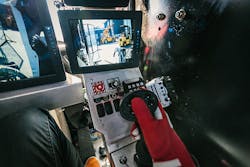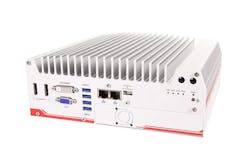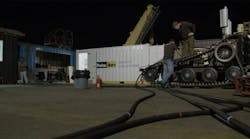If you're old enough to recall a time before MP3's, you may remember people used to attach portable CD players to their hip for their morning jog. The good ones had electronic skip protection, which buffered the audio data so if the device was jostled, the song wouldn't be interrupted.
The reason we bring this up, besides bragging about the cool tech we Gen Xer's had in the '90s, is because protection from shock and vibration is also very relevant to giant robot combat.
One downside to piloting a giant mech is that visibility is just slightly better than a tank's. So imagine what would happen if Eagle Prime took a haymaker right to the chin. All those cameras and video processors positioned to give co-pilots Gui Cavalcanti and Matt Oehrlein situational awareness from their cramped cockpit might do more than just skip.
"If that computer goes down because it gets jostled, the whole robot will stop working," says Oehrlein. "It's super important that doesn't happen and that's why we need such a robust solution."
For that robust solution, MegaBots approached Vermont-based computer manufacturer Logic Supply, ultimately selecting their Nuvo-5000 Rugged Fanless PC as the primary video processing platform. The video runs from cameras and actuation computers mounted on the arms which feed into dash-mounted monitors. This gives the pilots a clear idea of where to position their arms for a strike, or that one might be coming at them. The Nuvo-5000 has the necessary connectivity (6 LAN and 8 USB ports) to support multiple video inputs, and processing powered by an Intel Skylake CPU, to take care of these tasks. But more importantly, it's built tough enough go the distance with Suidobashi Heavy Industries' Kuratas.
"With two giant mechs fighting each other, you're going to have a lot of impact force and there is going to be a lot of friction and shock impacts to the systems," says Darek Fanton, Logic Supply's liaison to MegaBots.
He says the solid-state construction ensures the system will take just about whatever Japan's Kuratas can throw at the American mech.
"Impacts and vibration are not going to negatively affect the systems and performance," Fanton says.
The ventless steel container won't let in any dust or shrapnel, so during battle, the computer's circuit boards will remain uncompromised.
With an operating temperature range of -25°C to 70°C, the platform will also be able to survive long trips to new fight venues across the globe.
"Essentially, it's all cooled passively by convection," Fanton says. "The system becomes a heat sink, allowing the air on the outside to dissipate the internal heat."
He says the limit-pushing MegaBots is really the perfect test case for Logic Supply's ruggedized industrial computers, which can be found in extreme environments such as metal foundries and steel plants for visioning applications such as finished goods inspections.
"If anybody is doing full extent testing, it's MegaBots," Fanton says. "That's one of the reasons we were excited to work with them to spec in one of our systems. It's an extreme example of what many of our industrial computer clients put our systems through every day."

















